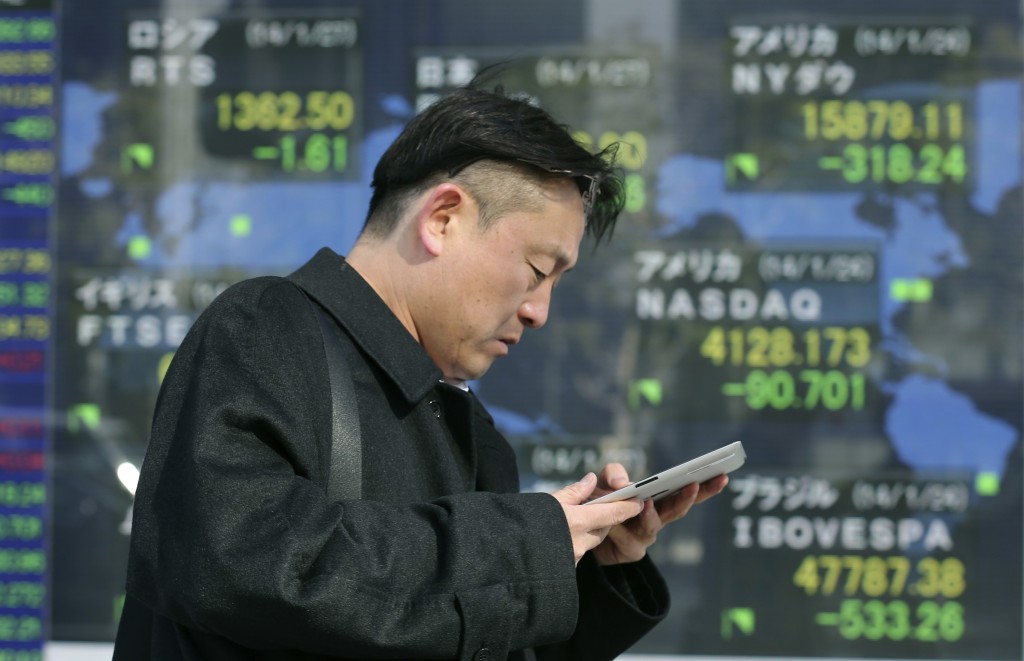
A man walks by an electronic stock board of a securities firm in Tokyo, Monday, Jan. 27, 2014. Asian stock markets sank on Monday following the worst losses on Wall Street in seven months, with investors gripped by renewed fears over emerging economies days ahead of a crucial Federal Reserve policy meeting. AP PHOTO/KOJI SASAHARA
HONG KONG—Asian markets sank on Monday following the worst losses on Wall Street in seven months, with investors gripped by renewed fears over emerging economies days ahead of a crucial Federal Reserve policy meeting.
Japan’s Nikkei, which was the best performer last year, continued its 2014 downtrend as the yen remained elevated against the dollar, while shares in developing countries also suffered selling pressure.
“Capital is fleeing equities generally,” said Hiroichi Nishi, SMBC Nikko Securities general manager of equities.
“For Japan, the combination of weaker US stocks, a weaker dollar, and heightened fears over a slowing of global economic growth will be enough to send stocks down,” he said.
Tokyo tumbled 2.51 percent, or 385.83 points, to 15,005.73, Seoul fell 1.56 percent, or 30.22 points, to 1,910.34, Hong Kong dived 2.11 percent, or 473.96 points, to 21,976.10 and Shanghai gave up 1.03 percent, or 21.09 points, to end at 2,033.30.
Taipei dipped 1.58 percent, or 135.74 points, to 8,462.57 and Wellington was down 0.41 percent, or 19.90 points, at 4,853.79. Manila fell 1.78 percent, or 109.89 points, to 6,081.61.
Bangkok dropped 1.98 percent, or 26.04 points, to 1,288.59 and Mumbai fell 426.11 points, or 2.02 percent, to close at 20,707.45
Singapore ended down 1.09 percent, or 33.56 points, at 3,042.43 while Jakarta ended down 2.58 percent, or 114.56 points, at 4,322.78. Kuala Lumpur slid nearly 24 points, or 1.31 percent, to close at 1,778.88.
Sydney was closed for a public holiday.
In New York on Friday, the Dow sank 1.96 percent, the biggest percentage point fall since June last year, while the S&P 500 plummeted 2.09 percent and the Nasdaq lost 2.15 percent.
US investors ran for cover on Friday as an 11 percent slump in the Argentinian peso against the dollar refuelled concerns about emerging market currencies.
Those fears were exacerbated by data last week indicating manufacturing activity in China—a key driver of global growth—had contracted in January.
“There is a fear that there is going to be a contagion in emerging-market currencies,” Maybank Kim Eng head of sales trading, Kevin Foy, said.
The growing pessimism sent investors to seek out safer, lower-return assets, particularly the Japanese yen, which is considered a safe haven in times of economic uncertainty.
In New York the dollar sank to 102.30 yen Friday from 103.24 Thursday, while the euro fell to 139.92 yen from 141.39 yen.
In late afternoon Asian trade on Monday the dollar was at 102.49 yen and the single currency fetched 140.27 yen. The euro bought $1.3685 compared with $1.3678 Friday in New York.
Among emerging market currencies the dollar rose to 12,215 Indonesian rupiah from 12,180 rupiah Friday, while it was also at 62.68 Indian rupees from 62.16 rupees, at 45.41 Philippine pesos from 45.32 pesos, and 32.93 Thai baht from 32.86 baht.
Traders will now be looking to this week’s Fed meeting to see if it announces any further cuts to its stimulus programme.
The central bank last month said it would reduce its bond-buying by $10 billion a month from January to $75 billion, citing a pick-up in the economy.
However, the move has raised fears of a capital flow from developing countries as investors repatriate their cash to the West.
In oil trade, New York’s main contract, West Texas Intermediate for March delivery, was up 43 cents at $97.07 in afternoon trade while Brent North Sea crude for March eased 15 cents to $107.73.
Gold fetched $1,270.56 at 1045 GMT, compared with $1,259.60 late Friday.
Originally posted: 2:00 pm | Monday, January 27th, 2014